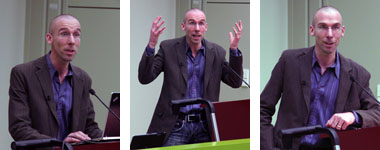Jan Sonntag, Dipl. Musiktherapeut FH

Interview of January 20, 2012 with Dr. Birgit Teichmann
Mr. Sonntag, you are a music therapist and your key area is music therapy with people with dementia. How can one envision music therapy with people with dementia?
In music therapy, music is used as a way of structuring relationships. In this context, it gives people with dementia a valuable opportunity to get in contact with themselves and their environment, experience emotional bonding, experience and express feelings as well as staying connected to their own life story. Depending on the indication (e.g. severity level of dementia), music therapy is taking place in individual- or group therapy sessions. Methodologically, this process- guided work also instrumentally accompanied by the music therapists, focuses on the singing of songs: In the songs, moods and sensitivities are reflected, they are a medium for memories and communication. For clear descriptions and video performances of music therapeutic encounters look at “Muthesius, D, Sonntag, J., Warme, B. & Falk, M. (2010): Musik- Demenz- Begegnung.
Are there scientific findings on how active music making or hearing certain music, affects moods of people with dementia?
At the moment, dementia is the most thoroughly examined field of application in music therapy. To examine the effects of music, presents itself with serious problems for the scientists as it is difficult to create “clean” studies in the living surroundings of people with dementia. And every change of environment in the cause of research results in significant changes of behaviour and experience of the probands. Nevertheless, some efficacy studies show significant reductions of agitation, fear and depression and led to the inclusion of music therapy in the S3 guidelines. Next to quantitative studies, qualitative studies play an important role in scientific attendance of music therapy. For a current overlook look at “Wosch, T. (Hg.) (2010): Musik und Alter in Therapie und Pflege, Kap. 1”.
How come that some people with dementia can fluently sing several lyrics with multiple verses and are otherwise not capable of speaking short sentences?
..one of the most valuable treasures music carries for people with dementia! Unfortunately (or luckily) it cannot be explained with only one approach. The procedural memory certainly plays a role: songs are being memorized like practical routines and therefore firmly embedded in memory and the simple musical structure (rhymes, simple melodies, recurring refrains etc.) contributes to that. Furthermore, in comparisons to language, music is extensively more cross-linked. Imaging techniques show, how all of the brain practically glows while making music. Another aspect is emotionality: music is the “language of feelings” and everything that is connected to emotions (furthermore mostly positive), is better remembered. By the way, a lot of children sing connected sentences and verses before they are able to speak 2 word sentences!
How important is the biography of a person for the work with music?
Very important, especially if you want to work against biography draining powers that take effect on people with dementia like changes due to dementia and systemic conditions: after the loss of close relatives and years in a nursing home, in most cases only a small file of medical data is left. And to have a “person” emerge from the “case” is a central task of psychosocial attendance, so also in music therapy. Interesting is the experience, that the memory triggering effect of music induces a lot of the biography, so it can have an influence on relationship work as well as in interdisciplinary exchange. Otherwise: super personal (archaic and spiritual) aspects of music allow musical encounters beyond personal life story.
Which psychological, social or physical “goals” do you want to achieve with the help of music therapy?
The quotation marks are appropriate, considering the life situation of people with dementia. What can still be achieved? Next to individual coordinated topics and goals, music therapy certainly takes place with the intention of maintaining identity, experiencing well-being, giving emotional support, creating a sense of community (this, music can achieve like no other medium!), enabling authentic encounters. Often it is about bringing something that came to a standstill back into motion. And often, from inner (mental) movement comes (physical) movement, the desire to dance: fall prevention par excellence.
Can personal taste in music change during the disease, meaning: can a person that has listened to classical music all his life, be drawn in by easy listening during his disease?
It happens quite often that during the course of dementia, easy music is preferred to more complex music. While moving into the nursing home, a patient from the educated middle class, scornfully turned her nose up to her fellow occupants that sang folk music, while some months later she enthusiastically sang those songs herself. The formerly so loved music of Brahms and Liszt irritated her.
What tips can you give relatives that want to integrate music into their everyday caretaking at home?
The more advanced age and dementia, the more important are following notes: Do not look at music as a matter of experts but as an original “part of humanity” (Oliver Sacks), that doesn’t have to be learned. Remember the early dialogues of mother/father and the little child in which sounds and melodies were used for intimate communication. Sing whatever comes to mind and give your singing voice as well as your movements musical expressions. Don’t look at music like medicine but as a way of creating togetherness. Do not put yourself under pressure but create a relaxed atmosphere.
.
Zur Person
.


